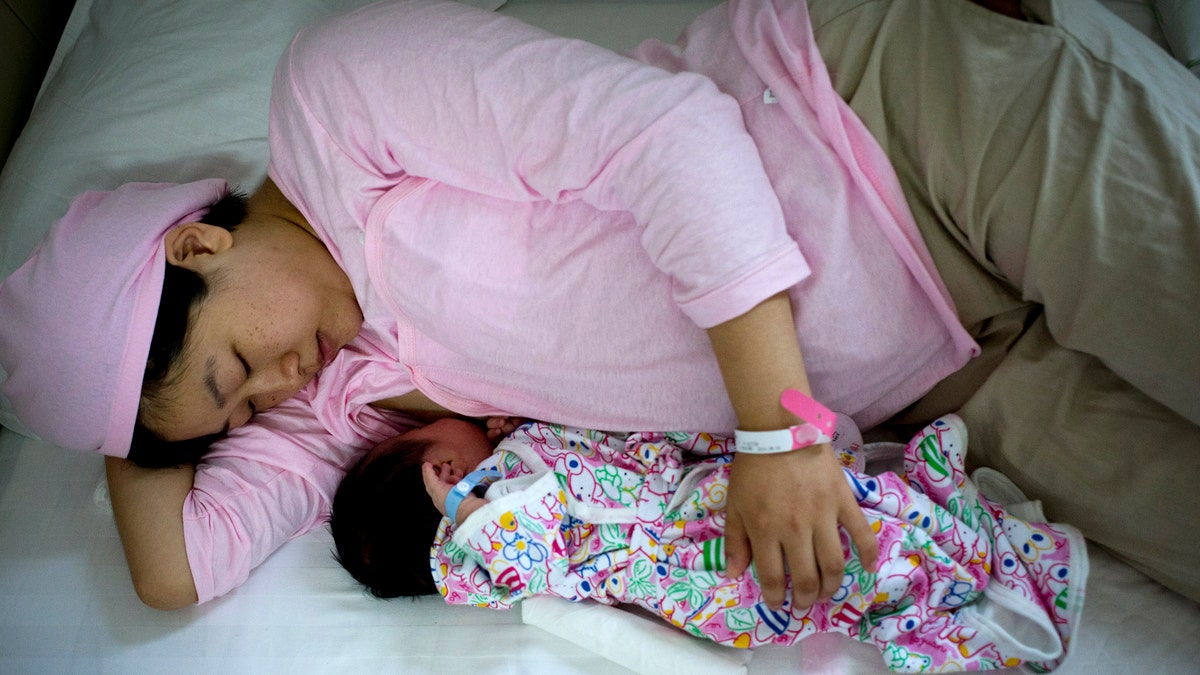
New mother Qi Wenjuan breastfeeds her 1-day-old son at Tiantan Hospital's maternity ward in Beijing, China. (AP Photo/Andy Wong)
Mothers who share a bed with their babies are more motivated to breastfeed and more likely to keep it up for the recommended six months, according to a U.K. study.
Although breastfeeding is to be encouraged, public health messages have to balance that with education so new mothers understand the danger to babies inherent in co-sleeping, the researchers write in Acta Paediatrica.
"Women who are most motivated and have the strongest intent to breastfeed are most likely to adopt bed-sharing as a strategy for attaining their breastfeeding goals," said lead author Helen Ball, director of the Parent-Infant Sleep Lab at Durham University, by email.
It is unrealistic to tell breastfeeding women not to share a bed, Ball said, but "Women should have information that allows them to make informed choices about bed-sharing."
The World Health Organization recommends that mothers breastfeed exclusively until an infant is 6 months old and combine breastfeeding with other foods up to 2 years of age.
Only about half of mothers in the U.S. continue breastfeeding through the first six months after birth, according to the Centers for Disease Control and Prevention (CDC).
The researchers used data collected in a larger study in the north-east of England from 870 new mothers who were recruited halfway through pregnancy.
For 26 weeks following birth, mothers responded to a weekly, automated phone survey. They gave information about whether they had breastfed and whether they had slept in bed with their baby for at least one hour in the past week.
Overall, 44 percent of mothers said that they "rarely" or "never" bed-shared, 28 percent did so "intermittently" and 28 percent said they shared a bed with their infant "often."
More of the women who said they bed-shared often were still breastfeeding after six months. Those who sometimes shared a bed tended to breastfeed for around five and a half months, while those who bed-shared rarely breastfed for an average of just over three months.
The mothers who often bed-shared had also demonstrated more motivation to breastfeed during the prenatal period. For example, 70 percent of women who ended up bed-sharing often had said before birth that they viewed breastfeeding as important. That compared to about 56 percent among woman who ended up bed-sharing intermittently or never.
Similarly, 95 percent of frequent bed-sharers had expressed a strong intent to breastfeed during the prenatal period, compared to 87 percent and 82 percent, respectively, of mothers who bed-shared intermittently or rarely.
Amy Brown, a professor of public health at Swansea University in Wales, noted that breastfed babies need to feed often to keep up the mothers' milk supply and can feed as often as every two hours, even at night.
Brown told Reuters Health by email that "feeding a baby this much can be really tiring, especially if new mothers are expected to go back to work or need to care for other children in the day."
Sleeping in the same bed can be helpful, Brown said. "Anything that helps mothers to get more sleep, and helps to make sure that the baby feeds frequently is really important."
The CDC warns against sleeping in the same bed with an infant, noting that it can be connected to Sudden Infant Death Syndrome (SIDS) and that infants may accidentally be suffocated by pillows or an adult rolling over onto them.
"After consuming drugs or alcohol, if you smoked during pregnancy or since birth, if your baby was premature/low birthweight, or if you sleep together on a hazardous surface such as a sofa" the risks of co-sleeping increase, Ball noted.
Brown said mothers should not share a bed if they take sedative medications, are very obese or are extremely tired. She also advised that babies should sleep on their backs under light blankets, away from duvets and pillows.
"Other children should not be sharing the bed with the baby, and the baby should sleep to the side of the mother, not between the mother and father," Brown added.
"The safest bed-sharing outcomes happen when bed sharing is planned, the bed made safe and everyone in the bed aware that the baby is there," Brown said.







































